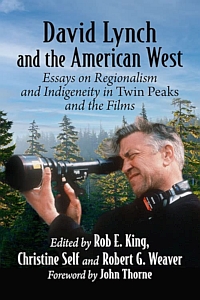Usually, whenever American director David Lynch introduces a new film, audiences can be almost certain that it will contain a couple of dreamlike, surreal, noir or neo-noir settings, characters or specific places. It may also feature different regional settings or the story could follow the travels or quests of the protagonist through several states.
 This director is famous for reliably delivering a blend of mystery, horror, and even comedy. Even though, as the essayists of the title at hand demonstrate, in his projects, he often shows a return to the same patterns.
This director is famous for reliably delivering a blend of mystery, horror, and even comedy. Even though, as the essayists of the title at hand demonstrate, in his projects, he often shows a return to the same patterns.
The American West, as well as its myths and iconic characters like The Cowboy, the themes of migration, arrival, journey, relocating and homecoming in connection with the West seem to be some of the major themes. “From Wild at Heart to Twin Peaks Season 3, also known as The Return, the American West informs and envelops Lynch’s later work.”
The wide-open spaces are likely the place where his protagonists find their answers, even though this environment also is tricky, can be deceiving and danger lurks there, too. This may be related to Lynch’s biography who lived in New York and Philadelphia, before settling in Los Angeles; the cramped, dark, filthy spaces of the cold metropolis in the East – represented by the settings of Eraserhead and The Elephant Man, for example.
John Thorne in the foreword explains that the essays “examine Lynch’s work in terms of setting (Regionalism), social and historical context (Indigeneity), and style (Road Narrative and Genre).”
So the fifteen essays, organized in the three sections above, deal, for the most part, with the series Twin Peaks, to a lesser extent with Lost Highway and Eraserhead. However, they all are related to the concept of the American West in his works. Actually, most of the action in Twin Peaks Season 3 takes place in New Mexico, Nevada, and Odessa, Texas. The collection is, as the editors state, “the first book of essays to collect dedicated studies on American western regionalism as well as elements of the Western genre across Lynch’s filmography.”
With this collection of essays, a different (mostly Twin Peaks-esque) perception of the Western – or quotes, allusions to and a spirit of recreating a state of familiarity with the genre – is possible; if we keep in mind that only within the last 80 or 90 years the west as we know it came to us in the cinema or through the TV. Before that, anything from iconography, landscape, indigenous peoples, art and even food was transported by paintings, travel reports, fiction or sculpture.
Lynch is one of many directors who not only uses traditional depictions of the west, but clearly shows different approaches to it, by placing contemporary characters from other American regions (or times) in it. Not always are they easily identified in his projects. (Which wouldn’t stop him from having “The Cowboy” from days long ago appear in Mulholland Drive.)
Furthermore, Lynch is known to be a fan of Eastern philosophy (and religion), which may be one reason for the many visions, dreams, miraculous or supernatural events and so forth that are part of his plots. That phenomenon – in addition to experiencing regionalism, the West, indigenous ways of understanding and seeing the world – sometimes makes sense to audiences, if they allow for Lynch’s vision and presentation to work during an episode of a full-length feature film. The texts here, among other aspects, refer to those alternate ways of conceptualization, besides offering many more suggestions and links.
While in this case, all essays (on usually 10-15 pages) are either good or very good, two stand out a bit. Andrew T. Burt’s “I’m Going West, Diane – Masculinity and the Cowboy Archetype …” and David Titterington’s “It has something to do with your heritage – Indigenous Arts in Twin Peaks” are perfect texts to get started with the book.
David Lynch and the American West is a solid title on his portraits of America, a changing and yet familiar version of Americana, and its western regions. It evidently profits from a wide range of international Lynch specialists, who are authors from very different disciplines, as here we have not only film critics and historians, but also experts on American literature, Native North American Art, and true-crime narratives.
Review by Dr. A. Ebert © 2023
Rob E. King, Christine Self and Robert G. Weaver (eds.) David Lynch and the American West: Essays on Regionalism and Indigeneity in Twin Peaks and the Films. McFarland, 2023, 214 p.
